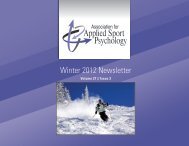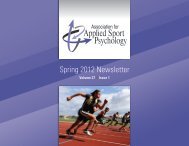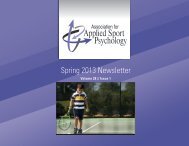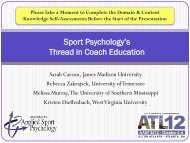Performance Excellence Movement - Association for Applied Sport ...
Performance Excellence Movement - Association for Applied Sport ...
Performance Excellence Movement - Association for Applied Sport ...
You also want an ePaper? Increase the reach of your titles
YUMPU automatically turns print PDFs into web optimized ePapers that Google loves.
<strong>Per<strong>for</strong>mance</strong> <strong>Excellence</strong> <strong>Movement</strong><br />
December 2009; Vol. 6(1)<br />
Can you tell us more about your research emphasis and how you apply it in the <strong>Per<strong>for</strong>mance</strong> Psychology Lab?<br />
>>> I optimistically and sincerely believe that our continued examination of emotional influences on<br />
behavioral processes will allow the advancement of practical recommendations to maintain a positive,<br />
productive, and efficient per<strong>for</strong>mance state. Likewise, by creating a more comprehensive account of the<br />
underlying interactions between the environmental cues and attentional allocation tendencies that<br />
perpetuate and precipitate emotional problems, the development of interventions to alleviate these<br />
problems can be further specified and evaluated. Indeed, the pursuit of related yet different questions in<br />
per<strong>for</strong>mance and health domains is challenging, yet I feel that a degree of diversification is advantageous<br />
as it enables us to pursue a general area of research while protecting against stagnation in specific<br />
paradigms and methodologies. In addition, I strongly feel that maintaining multiple related interests will<br />
enable the development of logical, comprehensive yet united theory of emotion and behavior that is<br />
enriched through the multiple perspectives from which it emerges.<br />
How did you get started in this field?<br />
>>>In the field of sport psychology ?… it was an accident!… I had graduated from Miami University in<br />
Ohio with a Psych degree and was perfectly content to take a year off and continue tending bar in Ox<strong>for</strong>d<br />
when I stumbled upon a bulletin board on sport psychology outside Robin Vealey’s office at Miami …<br />
without going into great detail, I eventually was admitted to the sport psych program at Springfield<br />
College, and then did my doctoral work at UF, where I developed a primary interest in how emotion<br />
influences attention and motor function.<br />
Have you used per<strong>for</strong>mance psychology in areas outside of sport and exercise?<br />
>>>Yes… with per<strong>for</strong>ming artists and an occasional pilot<br />
What sport psychology techniques do you find the most applicable in your work?<br />
>>>Like many sport psychologists, much of what I do is centered on creating a maximally functional<br />
preparatory state that the per<strong>for</strong>mer can both identify and consistently create…with an emphasis on being<br />
able to attend to the right thing(s) at the right time and then generating the most appropriate action(s).<br />
Motivational, emotional, and attentional mechanisms that yield expert per<strong>for</strong>mance are closely<br />
intertwined, though temporally contribute to per<strong>for</strong>mance outcome in different ways. It is through this<br />
framework that I employ such interventions as goal setting, emotion regulation, attentional focusing. The<br />
primary vehicle through which I train this skills is imagery, our “built in simulator”…with a strong<br />
emphasis on the maximal preparation to build greater confidence and firmly rooted expectations <strong>for</strong> future<br />
success.<br />
Do you have any suggestions <strong>for</strong> students who are interested in a per<strong>for</strong>mance psychology route?<br />
>>>Develop a strong background (and balance) in kinesiological and psychological science, and training<br />
/ experiences working with clients. Most importantly, I believe it is critical to understand the<br />
psychological mechanisms that can impact movement quality as ultimately, our goal as per<strong>for</strong>mance<br />
psychologists is to optimize these mechanisms at critical times (which vary widely from person to person<br />
and situation to situation).<br />
Can you tell me about your experience with applied sport psychology consulting?<br />
>>>My primary appointment at UF is as a researcher and teacher. <strong>Applied</strong> work is not a part of my<br />
academic assignment. However, applied work is something I enjoy, devote significant “extracurricular”<br />
time to, highly value, and take very seriously. As is likely clear from my other answers, I buy<br />
wholeheartedly into the model of a “scientific practitioner” in my wok with athletes and other per<strong>for</strong>mers.<br />
15






